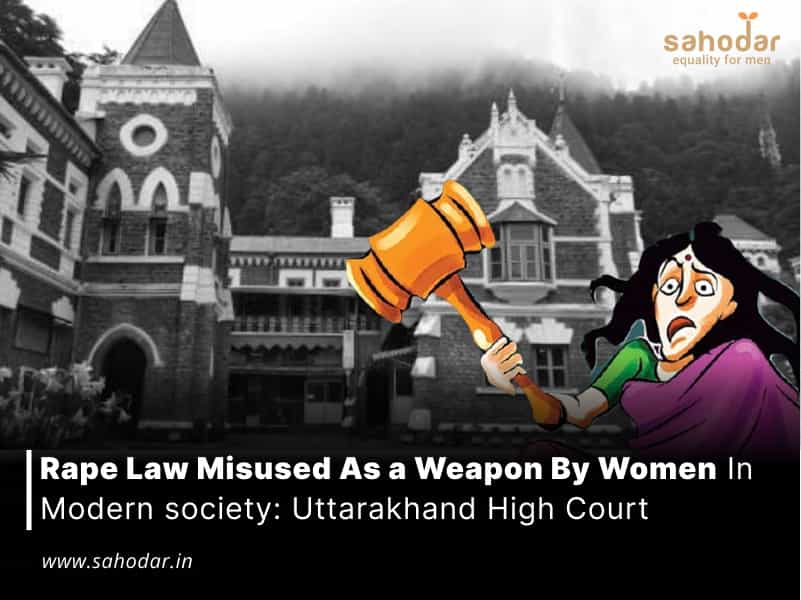The law punishing rape under Section 376 of the Indian Penal Code (IPC) is often being misused like a weapon by women especially when differences arise between a woman and her male partner, the Uttarakhand High Court recently made this remark.
Justice Sharad Kumar Sharma made the remark while quashing criminal proceedings initiated against a man who had sexual relations with a woman allegedly on the promise of marriage.
The judge said,” In fact, the offence under Section 376 of the IPC as of now in this modernised society is being misused as a weapon by the females to be misutilized (sic), as soon as there arise certain differences between herself and her male counterpart, and rather it is being used as a weapon to duress upon the other side for a number of undisclosed factors, and it cannot be ruled out, that the provisions contained under Section 376 of the IPC are being rampantly misused by the females.“
The Court also emphasized that the question of whether a promise to marry is false or not must be tested at the inception of such promise, and not at the later stages.
Notably, the Court also emphasized that you should determine, whether a promise of marriage is genuine or not, at the early stage of the relationship not on the later one.
As per the above statement, the Court held that the woman’s complaint of rape in this case would not stand since it was made 15 years after the beginning of the relationship and it is a long period. The Court also highlighted that the relationship also continued even after the accused married any other lady.
The Court said, “Ultimately, the conclusion, which has been drawn, is that an element or assurance of marriage, and on that pretext, entering into a consensual relationship, the falsity of an assurance of marriage is to be tested at its initial stage of inception, and not at a subsequent stage. The initial stage, herein, cannot be said to have been prolonged for 15 years, and even continued after the marriage of the applicant.”
In this case, the relationship was stated to have been incepted in 2005. Pertinently, the relationship continued even after the marriage of the man to another lady noted the Court.
As such, the bench questioned whether the complainant could claim that she had not consented to the relationship.
The Court opined, “When the complainant had voluntarily established a relationship even after knowing the fact, that the applicant is already a married person, the element of consent itself imbibes in it.”
The Court added that if there is an element of consent, then there is no point of terming as rape and it would be a consensual relationship.
The judge further found that the Court is called the balance equity and examine whether a woman was actively involved in a relationship, to determine if the offence of rape was made out, considering the gravity of the offence, although “it seems to be a social menace, which is normally levelled against a male.”
The Court further relied on many past Supreme Court rulings made on the ground of consent and the distinction between a false promise to marry and a breach of such a promise at a later stage, before ordering the plea of the accused to quash the rape case against him.
Advocate Raj Kumar represented the side of the accused-applicant. Deputy Advocate General TC Agarwal appeared for the State, while Advocate Pankaj Singh Chauhan appeared for the complainant-woman.
Source: https://www.barandbench.com/news/litigation/rape-law-misused-weapon-women-modern-society-uttarakhand-high-court

